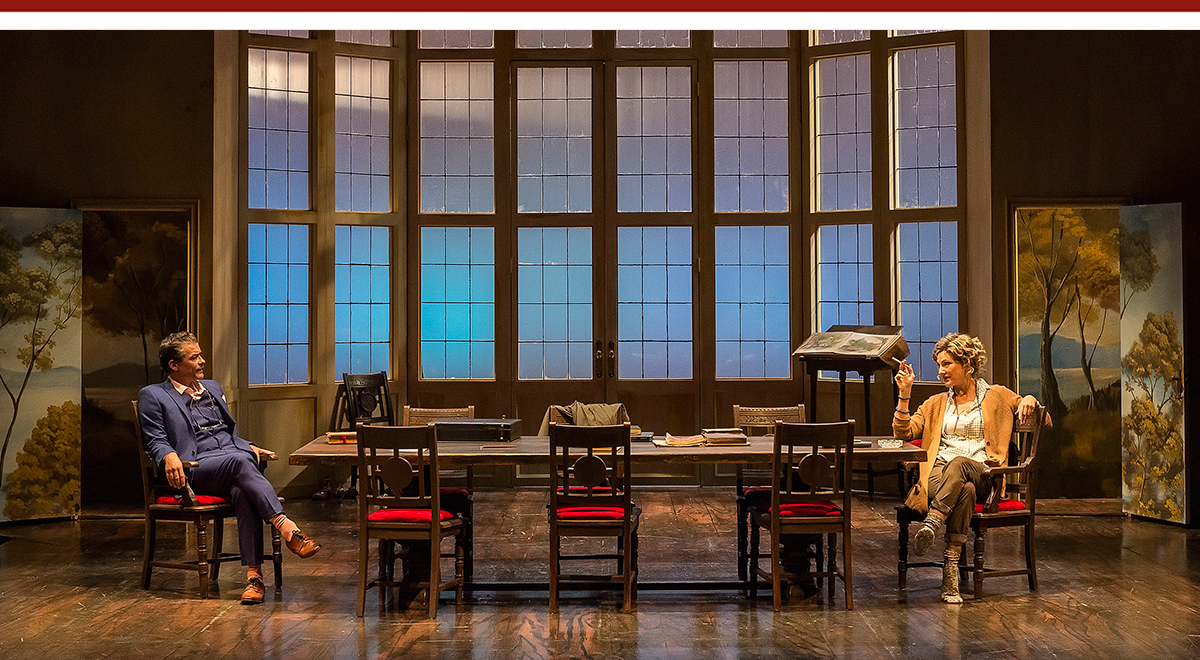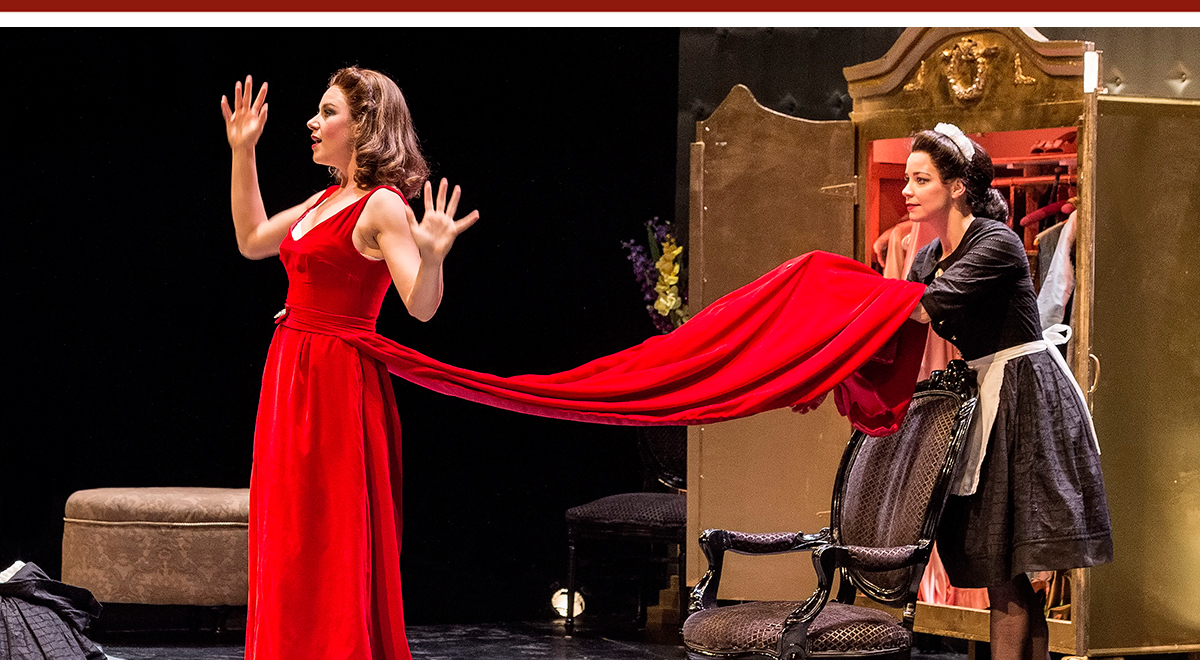SEPTEMBER 2016
Click title to jump to review
ALL THE WAY by Robert Schenkkan | South Coast Repertory
ARCADIA by Tom Stoppard | A Noise Within
THE MAIDS by Jean Genet | A Noise Within
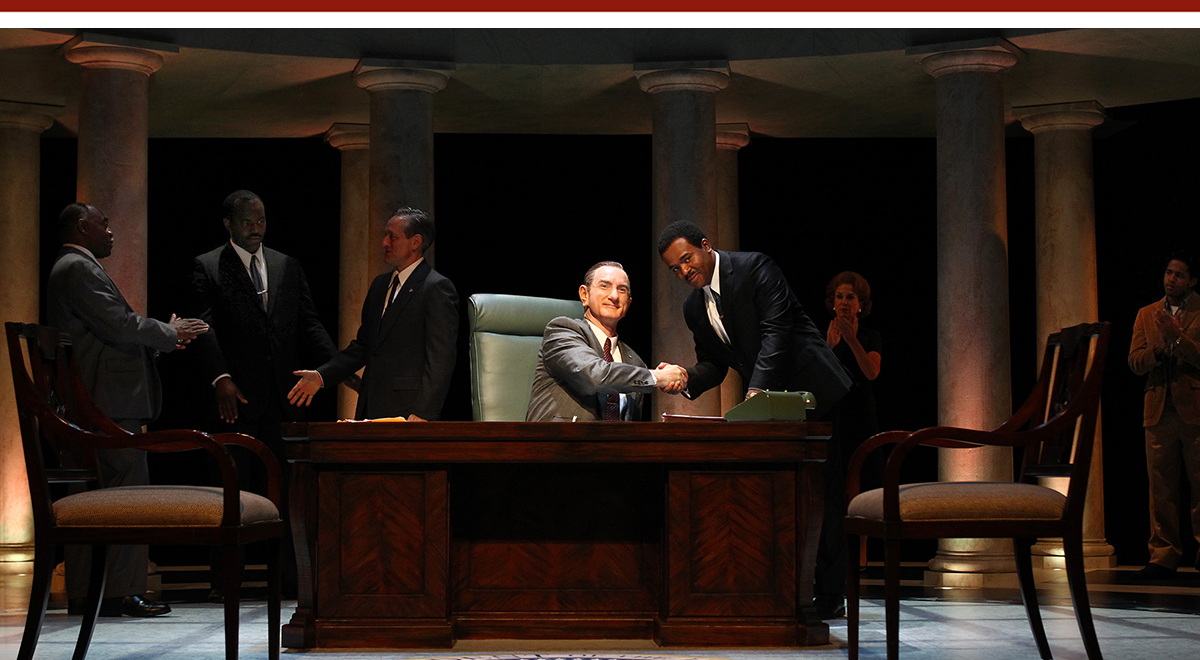
Legacy of will
Weeks before a Presidential election that tests Americans' grasp of the seriousness of the office, South Coast Repertory opened its 2016-17 Season with an account of Lyndon Baines Johnson's year as an "accidental President." As detailed as it is dramatic, Robert Schenkkan's All The Way covers the 11 months that began on November 22, 1963 with the assassination of John F. Kennedy and ended the following November 3 with Johnson's landslide reëlection.
The play's title, which comes from Johnson's campaign slogan, "All the way with LBJ," refers to his determination to do whatever it takes to complete passage of civil rights legislation. To overcome entrenched resistance, much of it from the good-old-boy network that helped him rise from Texas Representative to Speaker of the House, he would use the powers of his office and, more importantly, his personal powers to persuade, cajole and strong-arm.

Hugo Armstrong leads SCR Artistic Director Marc Masterson's cast. Though Makeup Designer Kevin Haney's prosthetic ears hang on Armstrong like size double-X when extra large would do, the actor's performance is amazingly fit, ranging from quiet moments of circumspection and intimacy to displays of overbearing bombast. Armstrong and Masterson use this spectrum to capture the Shakespearean promise within Schenkkan's portrait, and the performer within Johnson's crusader. In return, LBJ's stamina clearly energizes Armstrong, who at the end of an eight-show week was going strong despite rarely leaving the stage during the three-and-a-quarter-hour production.
The historical value of All The Way is admirable. So is the way we are left with a balanced sense of his motivation: Was he driven by desire to improve conditions for the victims of poverty and prejudice he lived alongside as a child or by a hunger for personal greatness? What's more, the Johnson we see in the 11 months that Schenkkan covers meets the American requirement that heroic drama focus on a single individual beating insurmountable odds. If the script has a deficit, it would be trading in some of the time spent on political machinations to better reveal the inner man through the give-and-take of his marriage to Lady Bird, who is given full dimension by Nike Doukas, especially in their one extended scene together.
Of course our hero did not do this alone, and the other principle figures to emerge here, as in the other accounts that have marked the 50th Anniversary of the legislation, are Martin Luther King Jr. and Senator Richard Russell. Larry Bates gives King the restraint and strength that allowed him to stand fast as the one mighty link between civil rights leaders and the White House. As Russell, the mentor who Johnson would need to go against in order to move ahead, Larry John Meyers shows Russell's fondness for Johnson despite his firmness against change.
Armstrong, Bates and the excellent JD Cullum as Hubert Humphrey are the only cast members with single roles. Among the many standouts in Masterson's cast are Robert Curtis Brown as J. Edgar Hoover, Tracey A. Leigh as Mrs. King and Fannie Lou Hamer, Darin Singleton as Johnson's assistant Walter Jenkins, Bo Foxworth as Robert McNamera, and Jeff Marlow as George Wallace and my childhood U.S. Representative, James Corman.
Backstage, behind Ralph Funicello's brilliant set whose huge convex colonnade focuses attention on Johnson's oval office desk, there must be a choreographed mayhem rivaling "Saturday Night Live." The quick changes in and out of Holly Poe Durbin's costumes and out from under the wigs and hairpieces required an army of additional staff first to build and then to dress during the run. They are listed at right.
Of course, the full Shakespearean scope will require a Lyndon I, Part 2, in which the soaring master of American politics is sucked down into the inescapable tar pit of an unwinnable Vietnam War. The driven, power-chasing President would be so damaged by the cost and divisions caused by the Vietnam quagmire that he would not seek a second term. He would leave office on January 20, 1969 as the made-for-Shakespeare figure of Richard Nixon took the reins, and die just four years later, exactly two weeks after Nixon began a second term that would end in resignation within a year and a half.
Related Theatertimes' stories … "How History Plays," about the original Oregon Shakespeare Festival staging and its move to Broadway; An interview with OSF Artistic Director Bill Rauch, the director of the premiere and Broadway productions.
top of page
ALL THE WAY
by ROBERT SCHENKKAN
directed by MARC MASTERSON
SOUTH COAST REPERTORY
September 2-October 2, 2016
(Opened 9/9, Rev’d 9/25e)
CAST Matthew Arkin, Hugo Armstrong, Larry Bates, Jordan Bellow, Robert Curtis Brown, JD Cullum, Gregg Daniel, Nike Doukas, Bo Foxworth, Lynn Gallagher, Christian Henley, Hal Landon Jr., Tracey A. Leigh, William Francis McGuire, Jeff Marlow, Rosney Mauger, Larry John Meyers, Darin Singleton
PRODUCTION Ralph Funicello, set; Holly Poe Durbin, costumes; Jaymi Lee Smith, lights; Charles Coes/Nathan A. Roberts, music/sound; Kristin Ellert/Shawn Sagady, projections; Tracy Winters, dialect; Joanne DeNaut, casting; Kathryn Davies/Roxana Khan, stage management
Plus … J. Wendy Wallace, Costume Design Assistant; Lauren Graham, Lalena Hutton, Megan Knowles, Lauren Smith, Marlene Solis, Sarah Timm, Additional Costume Staff; Jessica Vankempen, Costume Intern; Gillian Woodson, Wig and Makeup Technician; Jessyca Wardlow-Harper, Wig and Makeup Assistant; Portia Flemming, Jenni Gilbert, Melanie Hinchee, Kaity Licina, Gina Peggot, Christine Steincamp, Additional Wig Staff …
Bert Henert, Wardrobe Supervisor; Rebecca Clayton, Lisa Leonhardt, Dressers; Isaac Jacobs, Deck Crew; Julia Bates, Thomas Nagata, Stage Management Interns
HISTORY World premiere at the Oregon Shakespeare Festival. Developed in part with assistance from The Orchard Project (The Exchange)
Gregg Daniel, Rosney Mauger, JD Cullum, Hugo Armstrong, Larry Bates, Lynn Gallagher and Christian Henley, top; inset, Armstrong and Nike Doukas
Debora Robinson
Heat equations
Tom Stoppard's Arcadia is a rare theatrical achievement. Profoundly intellectual yet genuinely human, it succeeds as thoroughly entertaining comedy while offering a colloquy on subjects ranging from painting, poetry and landscape architecture to mathematics, relativity, quantum mechanics and more. Points of view collide in towering spark-showers of ideas that, like the best paintings, poems and theories, seem even more brilliant with repeat viewings.
The Tony, Drama Desk and Olivier Best Play is back in Southern California, a few hundred yards west of our own Arcadia, in an accessible, fully realized season-opening production at A Noise Within (through November 20).
Co-Artistic Director Geoff Elliott's cast of skilled, confident actors provides clarity and character while leaving the fireworks to the text. And the director has established a comfortable pace that belies the production's two-hour-forty-five-minute length. His company is accomplished and appealing across the board, but Susan Angelo's Hannah Jarvis and Freddy Douglas' Bernard Nightingale stand out as major additions to the play's local production history.
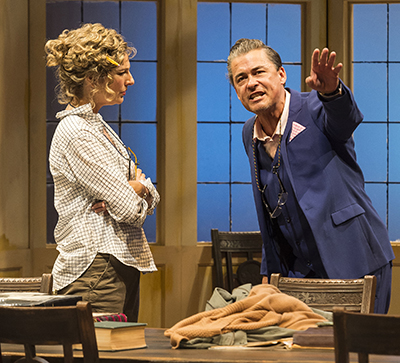
Arcadia moves back and forth between 1809 and the present (the play premiered in 1993), but remains in the same room at Sidley Park, the ancestral estate of the Coverly family. Then as now, the heads-of-household are Lord and Lady Croom, a title bestowed on the lineage by Charles II.
Propelling the play is a curious detective story in which a pair of modern-day academic authors are scouring Sidley Park's archives, looking through journals and notebooks from the early 19th Century to prove their separate theories about different individuals who may have spent time at the estate. Scenes of their investigation alternate with scenes set in April 1809 that show the very people and events they are pursuing.
Jarvis is writing a book on English gardens of the era, with a special interest in those containing a hermitage, a rustic dwelling that was part of the trend to return the landscape from a manicured design to something wild and unruly. Nightingale arrives as an uninvited guest, chasing down a lead that Lord Byron had once visited the estate and been quickly embroiled in romance and revenge.
While Lord and Lady Croom are not contemporary characters, their children are: Valentine (Tavis Doucette), a young mathematician smitten with Hannah; Chloë (Jill Renner), a ripe post-adolescent; and Gus (Richy Storrs), a timid possible genius who hasn't spoken since age 5. Gus also adores Hannah, and he appears only to nervously present her with love tokens from nature and scurry away.

Era-hopping is more than a dramaturgical exercise for Stoppard. He is playfully contradicting time's inability to go backwards, something his characters discuss in the opening scene. In 1809, 13-year-old Thomasina Coverly (Erika Soto) is questioning the nature of things with the live-in tutor, 22-year-old Septimus Hodge (Rafael Goldstein). She is at an age of awakening, and although hampered by prejudices against her age and gender, her curiosity also propels the play, in a way pushing it forward as Hannah and Bernard burrow back into history to find her. It will be Valentine who eventually discovers her true nature in a note she jotted in the margin of her workbook.
On this morning, however, Thomasina wants Septimus to explain the more worldly issue of an illicit "carnal embrace" in the estate's gazebo. He instead directs her back to reviewing Fermat's Last Theorem, which she grasps easily before asking about more far-reaching questions regarding how the universe works. Coincidentally, the 300-year-old mathematical mystery that Fermat created with a note jotted in the margin of a book, would be solved soon after Arcadia premiered by an Englishman who had encountered it when he was a little younger than Thomasina.
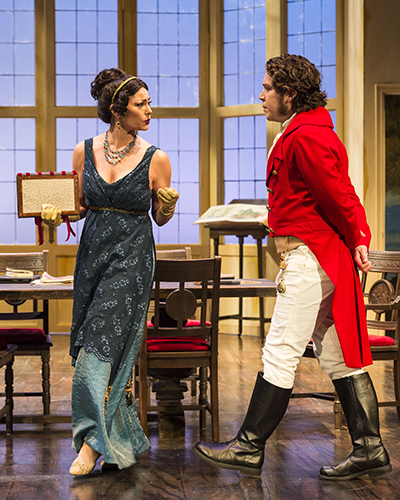
We quickly learn that it was Septimus in the gazebo with the wife of Ezra Chater (Jeremy Rabb), author of two large volumes of petty poetry. Chater, in high dudgeon and accompanied by Lady Croom's brother, Captain Brice (Stephen Weingartner), now enters to accuse Hodge and demand satisfaction. Lady Croom (Abby Craden) arrives for a meeting with landscape architect Richard Noakes (Eric Curtis Johnson) and check on daughter Thomasina. Noakes presents his plans for the garden renovation that Lord Croom has requested.
Within these opening scenes, Stoppard has quickly laid out the nature of both the natural mysteries and human intrigues his characters will pursue: Mr. Chater and his wife's lovers; Hannah and the hermit; Bernard and the facts surround Lord Byron's visit; and most enchantingly, Thomasina and the true nature of math, man and love.
Angelo gives Hannah the keen intelligence and passion to justify how her work has become her reason, possibly her excuse, for such fierce independence. Her dogged determination, mixed with cutting humor, is perfect dramatic counterpoint to Douglas' antic Bernard and their sparing creates the energy and color that, in some productions, can make the modern scenes pale in comparison to those in the earlier period.
Craden's Croom, earthy and imperious, gets every laugh the language affords without stooping to silliness. In Leah Piehl's excellent costumes, she has the cool beauty of Ava Gardner at the height of her appeal. Renner's Chloë has the right mercurial element. Her infatuation with Bernard heats quickly, burns a blue flame, and cools without a trace. Rabb is another gem. Appearing as if he stepped from the pages of a Dickens novel, his bemused, stork-like Chater is a perfect foil for the quick-witted Hodge.
Goldstein, the company's twenty-something clean-up hitter, again finds full dimension for his character, giving Septimus the sardonic wit and sense of restrained superiority he needs. His ultimate surrender to his pupil's brilliant innocence is endearing, and Soto creates a perfect complement: pure youth wise beyond her years. The production also benefits from fine contributions from Doucette, Johnson, Weingartner, Storrs and Mitchell Edmonds as Jellaby.
Elliott's design team also includes Frederica Nascimento (set), Jean-Yves Tessier (lights), Robert Oriol (music and sound), and Danielle Richter (wigs and make-up.
top of page
ARCADIA
by TOM STOPPARD
directed by GEOFF ELLIOTT
A NOISE WITHIN
March 29-April 17, 2016
(Opened 9/10, Rev’d 9/11m)
CAST Susan Angelo, Abby Craden, Tavis Doucette, Freddy Douglas, Mitchell Edmonds, Rafael Goldstein, Eric Curtis Johnson, Jeremy Rabb, Jill Renner, Erika Soto, Richy Storrs
PRODUCTION Frederica Nascimento, set; Leah Piehl, costumes; Jean-Yves Tessier, lights; Robert Oriol, music/sound; Danielle Richter, wigs/make-up; Josie Griffith-Roosth/Gabrielle J. Bruno, stage management
HISTORY Premiered April 1993 at the Royal National Theatre, London, directed by Trevor Nunn with Rufus Sewell (Septimus), Harriet Walker (Lady Croom) and Bill Nighy (Nightingale) among the cast. U.S. Premiere was in March 1995 at the Vivian Beaumont, directed by Nunn, starring Billy Crudup (Septimus), Jennifer Dundas (Thomasina), Blair Brown (Hannah) and Victor Garber (Nightingtale)
Freddy Douglas and Susan Angelo, top; first inset, Angelo and Douglas; second inset, Rafael Goldstein and Erika Soto; bottom inset, Abby Craden and Goldstein
Craig Schwartz
Arcadia is joined in repertory by Jean Genet's The Maids on September 18 and Molière's Imaginary Invalid on October 9.
Revenge of the Maids
Jean Genet used a sensational 1933 murder case as the starting point for The Maids, his 1947 fantasia on the destructive influence of class exploitation. Genet was as driven to create change in society as he was to innovate theater and the prominent use of role playing by his maids, fantasy and misdirection, make this an especially challenging work.
In the second production of A Noise Within's 2016-17 Season, a hard-working trio of actors under the direction of Stephanie Shroyer can't overcome the inherit confusion, making this a play that will be better appreciated by those who have done some advance study.
Solange (Donnla Hughes) and Claire (Jaimi Paige) are sisters, or so we assume by how they occasionally address each other. However, there are hints they may be lovers and the references to sisterhood are mutually empowering. Despite the intervening world war, it's likely audiences attending the play's premiere run would have remembered that the women who inspired Genet were indeed siblings with incestuous leanings. Though interesting, all this clouds rather than clarifies the story's central theme.
When the play begins, Madame (Emily Kosloski) is alone on stage in dim lights, preening for some appointment. Audience members in the center section may not notice Solange and Claire watching her from small balcony seats at either side of the back of the house. It's no fault of scenic designer Frederica Nascimento, who incorporates the boxes as best she can into her excellent, economical set. Angela Balogh Calin and Ken Booth contribute costumes and lights, respectively.
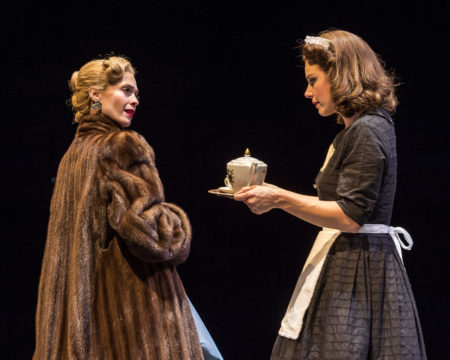
She leaves without a word, then appears to return with one of the maids. However something seems odd, and we may detect it is Claire pretending to be Madame. She browbeats Solange, insulting her and ordering her about. We will discover this is a game the sisters play when they have the apartment to themselves. It is their way of easing their contempt for Madame – and for Genet the ruling class – by impersonating her cruelty. It is also a way for them to create and practice scenarios of eliminating her. The original maids in 1933 killed their employer and her daughter.
Moving between what is real and what is imagined and what might be a hallucination makes it tough to know just what is happening and there isn't a lot of help provided by Genet to lend perspective on the sisters, and Shroyer hasn't found a way to contour the staging to add clues. It nevertheless is a worthy work to investigate and a quick study of Genet and his play will be a real bonus.
For their part, the actors perform nobly. Hughes is back after her memorable debut here as Juliet in ANW's Romeo and Juliet, giving Solange a respectable depth of anger, backbone, and determination. Paige works to distinguish Claire as she will perform in the murder, Claire as herself in real time, and Claire as Madame. Kosloski, so able in both A Noise Within back at ANW's Glendale location, and in the Geffen's Joan Rivers: A Work in Progress by a Life in Progress is the right haughty beauty for Madame's two scenes.
The 1963 adaptation is by Bernard Frechtman, Genet's longtime confidant and agent. According to Gene A. Plunka, in The Rites of Passage of Jean Genet: The Art and Aesthetics of Risk Taking, Frechtman commited suicide four years later after repeated attempts to reconcile with the writer failed. Genet had broken off contact because he "was particulary upset by the lack of compensation received for the American rights to his novels, the pirated edition of Gutter in the Sky and Frechtman's inability to reproduce the lyricism of Les Paravents. Perhaps something was missing from his translation and adaptation of The Maids, whose original French title, Les Bonnes, reveals Genet's intent to be both more poetic and ironic. It is translated as The Good Ones.
top of page
THE MAIDS
by JEAN GENET
translated by BERNARD FRECHTMAN
directed by STEPHANIE SHROYER
A NOISE WITHIN
September 18-November 12, 2016
(Opened 9/24, Rev’d 9/25m)
CAST Donnla Hughes, Emily Kosloski, Jaimi Paige
PRODUCTION Frederica Nascimento, set; Angela Balogh Calin, costumes; Ken Booth, lights; Martin Carrillo, music/sound; Danielle Griffith, wigs/makeup; Marcedes L. Clanton/Catherine Lee, stage management
HISTORY World premiere in April 1947 at Théâtre de l'Athénée, directed by Louis Jouvet. Bernard Frechtman translated the play in 1963.


